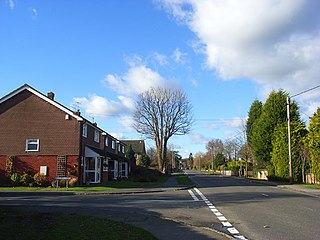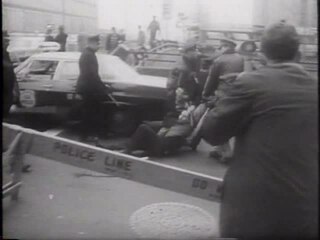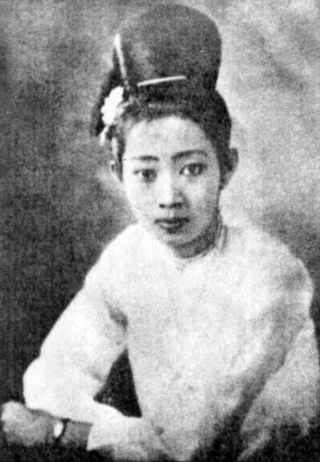
Pacifism is the opposition or resistance to war, militarism or violence. The word pacifism was coined by the French peace campaigner Émile Arnaud and adopted by other peace activists at the tenth Universal Peace Congress in Glasgow in 1901. A related term is ahimsa, which is a core philosophy in Indian religions such as Hinduism, Buddhism, and Jainism. While modern connotations are recent, having been explicated since the 19th century, ancient references abound.
Anarcho-pacifism, also referred to as anarchist pacifism and pacifist anarchism, is an anarchist school of thought that advocates for the use of peaceful, non-violent forms of resistance in the struggle for social change. Anarcho-pacifism rejects the principle of violence which is seen as a form of power and therefore as contradictory to key anarchist ideals such as the rejection of hierarchy and dominance. Many anarcho-pacifists are also Christian anarchists, who reject war and the use of violence.
The War Resisters League (WRL) is the oldest secular pacifist organization in the United States, having been founded in 1923.

Abraham Johannes Muste, usually cited as A. J. Muste, was a Dutch-born American clergyman and political activist. He is best remembered for his work in the labor movement, pacifist movement, antiwar movement, and civil rights movement.

Naphill is a village in the parish of Hughenden Valley, in Buckinghamshire, England. It is north-west of Hughenden, on the ridge of one of the Chiltern Hills, and is adjacent to the village of Walter's Ash.

Walters Ash is a village in the parish of Bradenham, in Buckinghamshire, England. It is located in the Chiltern Hills, to the west of the main village, adjacent to Naphill. Between 1983 and 1985 there was a peace camp outside RAF High Wycombe station. This was to protest about the RAF bunker on National Trust land designated a place of Historic Interest or Natural Beauty. There is also a water reservoir which was constructed at the same time. In February 2014 a sink hole opened under the drive of a bungalow and a car disappeared down it. The village is 32 miles (51 km) west of London and 3.92 miles (6.31 km) north west of High Wycombe.

A digital audio workstation is an electronic device or application software used for recording, editing and producing audio files. DAWs come in a wide variety of configurations from a single software program on a laptop, to an integrated stand-alone unit, all the way to a highly complex configuration of numerous components controlled by a central computer. Regardless of configuration, modern DAWs have a central interface that allows the user to alter and mix multiple recordings and tracks into a final produced piece.
Peace churches are Christian churches, groups or communities advocating Christian pacifism or Biblical nonresistance. The term historic peace churches refers specifically only to three church groups among pacifist churches:

Peace camps are a form of physical protest camp that is focused on anti-war and anti-nuclear activity. They are set up outside military bases by members of the peace movement who oppose either the existence of the military bases themselves, the armaments held there, or the politics of those who control the bases. They began in the 1920s and became prominent in 1982 due to the worldwide publicity generated by the Greenham Common Women's Peace Camp. They were particularly a phenomenon of the United Kingdom in the 1980s where they were associated with sentiment against American imperialism but Peace Camps have existed at other times and places since the 1920s.

RAF Daws Hill was a Ministry of Defence site, located near High Wycombe and Flackwell Heath, in Buckinghamshire, England, close to the M40 motorway.

A peace walk or peace march, sometimes referred to as a peace pilgrimage, is a form of nonviolent action where a person or group marches a set distance to raise awareness for particular issues important to the walkers.

Peace News (PN) is a pacifist magazine first published on 6 June 1936 to serve the peace movement in the United Kingdom. From later in 1936 to April 1961 it was the official paper of the Peace Pledge Union (PPU), and from 1990 to 2004 was co-published with War Resisters' International.
The No More War Movement was the name of two pacifist organisations, one in the United Kingdom and one in New Zealand.

Ludu Daw Amar was a well known and respected leading dissident writer and journalist in Mandalay, Burma. She was married to fellow writer and journalist Ludu U Hla and was the mother of popular writer Nyi Pu Lay. She is best known for her outspoken anti-government views and radical left wing journalism besides her outstanding work on traditional Burmese arts, theatre, dance and music, and several works of translation from English, both fiction and non-fiction.

A peace movement is a social movement which seeks to achieve ideals such as the ending of a particular war or minimizing inter-human violence in a particular place or situation. They are often linked to the goal of achieving world peace. Some of the methods used to achieve these goals include advocacy of pacifism, nonviolent resistance, diplomacy, boycotts, peace camps, ethical consumerism, supporting anti-war political candidates, supporting legislation to remove profits from government contracts to the military–industrial complex, banning guns, creating tools for open government and transparency, direct democracy, supporting whistleblowers who expose war crimes or conspiracies to create wars, demonstrations, and political lobbying. The political cooperative is an example of an organization which seeks to merge all peace-movement and green organizations; they may have diverse goals, but have the common ideal of peace and humane sustainability. A concern of some peace activists is the challenge of attaining peace when those against peace often use violence as their means of communication and empowerment.
John Nevin Sayre was an American Episcopal priest, peace activist, and author. He was an active member of the Fellowship of Reconciliation (FOR) and helped found the Episcopal Pacifist Fellowship. The US State Department official Francis Bowes Sayre Sr. was his brother.
Howard Haines Brinton (1884–1973) was an author, professor and director whose work influenced the Religious Society of Friends movement for much of the 20th century. His books ranged from Quaker journal anthologies to philosophical and historical dissertations on the faith, establishing him as a prominent commentator on the Society of Friends.
The 1917 Stockton-on-Tees by-election was a parliamentary by-election held for the British House of Commons constituency of Stockton-on-Tees in County Durham on 20 March 1917.

The existence of pacifism in Germany has changed over time, with the consistent feature of having diverse groups with a shared belief in an opposition to participating in war. These movements both individually and collectively, have historically been small in their numbers and have not been well organised. With a culture of war in the early history of Germany, pacifism was not a culturally significant group. This was driven by the government as they attempted to use the media in order to promote the expansion of Germany as a growing empire. The exception to this is during the Cold War with the Bonn demonstration with a large turnout of around 300,000 people. Christian peace groups have been the most consistent groups within the classification of pacifists as an opposition to violence is a key part of their faith. The size, whilst remaining small varies over the history of the Federal Republic of Germany. The reception from the public regarding pacifists also changes depending on the historical period.











